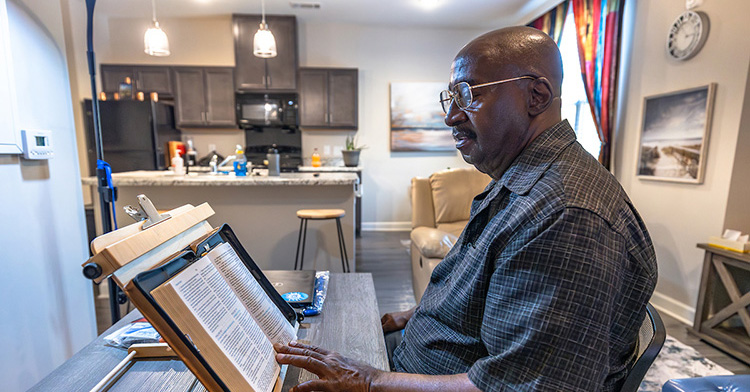I heard the pain in my son’s voice. He has worked for a large nonprofit for four years, drawn by its commitment to environmental justice, an issue he has passionately cared about since childhood.
Now he was describing his disbelief at how the organization’s leadership was responding to a budget shortfall.
He had expected top management to demonstrate concern for all employees in its efforts to ease the financial crisis. The proposed options, however, all seemed to protect the managers’ positions and salaries while putting many of the lower-paid employees’ jobs in jeopardy.
My son spoke up, questioning why across-the-board percentage cuts in salaries were not being considered. He expected an organization committed to social justice to practice justice internally.
Why does it hit us so hard when leaders behave this way? As a Christian organizational psychologist, I am interested in human suffering caused in the world of work.
I deeply desire to understand what helps us be healthy, motivated and productive for the sake of pursuing organizational goals as well as our own faithful fullness of life.
As a Catholic, I have been drawn into this area of study by my church’s teachings. Those teachings speak to the dignity of work, as well as criteria for just work conditions that uphold human dignity and offer a place to grow in meaningful acts of co-creating with God.
Pope Francis, echoing earlier Catholic Church social documents, has written: “It is through free, creative, participatory and mutually supportive labour that human beings express and enhance the dignity of their lives.”
In social psychology, an area of research called “organizational justice” explores issues of work, productivity and well-being. It may offer Christian leaders a clear lens and helpful language during this time of reassessment and healing as we seek to shape our workplaces to better reflect the wholeness and justice of the gospel.
Studies show that the way justice is practiced inside an organization and the perceived fairness of its rules and procedures affect workers’ sense of belonging and pride in working at the organization. This deeply influences how employees feel and act at work.
When we perceive justice and are proud to be identified with an organization, we tend to act positively, not just complying with what we are asked to do and refraining from negative behavior against the organization, but going above and beyond the obligatory.
We contribute by helping co-workers, generating ideas of how to do things better, recommending the organization to others and building up the organization in various ways.
Findings in organizational justice research have shifted the understanding of what motivates human behavior from the traditional thinking that people are oriented toward gain and against loss (also known as informed self-interest) to the view that people cooperate in groups primarily out of identity concerns and the perception of being valued and valuable.
Consider three major categories of employee perceptions within organizational justice.
• Distributive justice: perceptions of the fairness and appropriateness of the salary and benefits assigned to various positions, as well as access to positive longer-term economic outcomes such as job stability and promotions.
• Interactional or interpersonal justice: perceptions of the fairness and respectfulness with which people are treated by bosses and coworkers.
Psychologists see the human need for status and for social inclusion as underlying the experience of respect. When a group is important to us, respect from others shapes both our commitment to the group and our psychological well-being.
• Procedural justice: perceptions of the fairness of work procedures and decision-making processes -- and having voice.
Work procedures include recruitment and hiring processes; appropriate training and explanation of job expectations; provision of necessary resources; and control over working conditions and risks to oneself, others and the environment.
Decision-making processes range from who decides wages and how they are awarded to how job changes and promotions are decided and how complaints and conflicts are resolved.
Having voice means being able to express one’s opinions about the functions and conditions of the job and having influence on the decisions that affect it.
Even in a pandemic, organizational justice can -- and should -- happen.
Despite this time of greater financial constraints, one Christian organization with which I am familiar has recently demonstrated distributive justice, using the money allocated to a department for annual raises to increase the wages of lower-paid employees -- distributing it according to equity instead of hierarchy.
At a large group level, the German government has provided an example of procedural justice, through participatory problem solving and having voice. When the coronavirus first hit, German leaders opened the government’s process for developing solutions to the crisis to outside people and organizations.
They accepted “problem statements” from civilian technical companies and organizations and then hosted an online “hackathon,” #WeVsVirus, which drew more than 26,000 participants.
Writing in the Stanford Social Innovation Review, Thomas Gegenhuber highlighted the effort’s positive effects -- not only the “viable and useful technical solutions” it generated but the help it offered many participants in “overcom[ing] feelings of isolation and powerlessness.” Further, more than half of participants said the experience strengthened their trust in the German government.
My son, meanwhile, organized and spoke out for change in his organization because he cared enough, believed in it enough, and identified himself as a valued member of the staff. He used his “upward voice.”
His organizing and speaking up paid off, he told me. A new budget was passed without any involuntary layoffs.
As we work toward healing and reparation at all levels of society, Christian leaders may find organizational justice categories useful in paying attention to our workplace procedures and decision-making processes -- including whether employees have voice in the goals and conditions of work -- and to the respect and equity with which we treat each other.
By doing this, we may find that upholding the dignity and well-being of our employees is a balm for our own work motivation and satisfaction in a time of continued stress.















